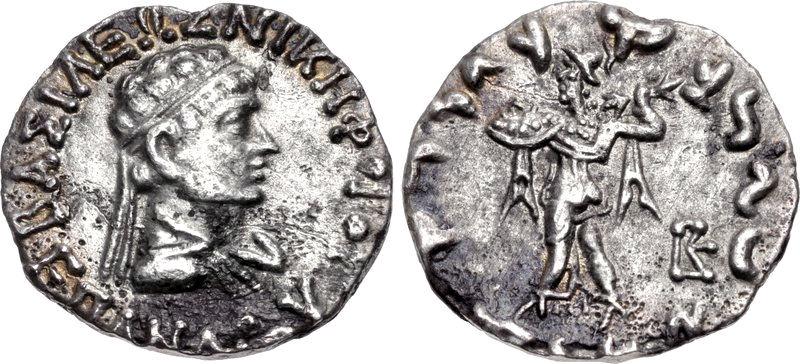Epander on:
[Wikipedia]
[Google]
[Amazon]

 Epander (
Epander (
Coins of EpanderLe Roi Epandre le Victorieux
{{Hellenistic rulers Indo-Greek kings 1st-century BC monarchs in Asia

 Epander (
Epander (Greek
Greek may refer to:
Anything of, from, or related to Greece, a country in Southern Europe:
*Greeks, an ethnic group
*Greek language, a branch of the Indo-European language family
**Proto-Greek language, the assumed last common ancestor of all kno ...
: ''Épandros'' meaning "above man") was one of the Indo-Greek
The Indo-Greek Kingdom, also known as the Yavana Kingdom, was a Hellenistic period, Hellenistic-era Ancient Greece, Greek kingdom covering various parts of modern-day Afghanistan, Pakistan and northwestern India.
The term "Indo-Greek Kingdom" ...
kings. He may have been a relative of Menander I
Menander I Soter (, ; ), sometimes called Menander the Great, was an Indo-Greek king (reigned /155Bopearachchi (1998) and (1991), respectively. The first date is estimated by Osmund Bopearachchi and R. C. Senior, the other Boperachchi –1 ...
, and the findplaces of his coins seem to indicate that he ruled in the area of Punjab
Punjab (; ; also romanised as Panjāb or Panj-Āb) is a geopolitical, cultural, and historical region in South Asia. It is located in the northwestern part of the Indian subcontinent, comprising areas of modern-day eastern Pakistan and no ...
.
Time of reign
Bopearachchi dates Epander to c. 95–90 BC and R. C. Senior to c. 80 BC. The scarcity of his coins indicate that his reign was short and/or his territory limited.Coins of Epander
Epander's silver drachms portray the king indiadem
A diadem is a Crown (headgear), crown, specifically an ornamental headband worn by monarchs and others as a badge of Monarch, royalty.
Overview
The word derives from the Ancient Greek, Greek διάδημα ''diádēma'', "band" or "fillet", fro ...
with a reverse of Athena
Athena or Athene, often given the epithet Pallas, is an ancient Greek religion, ancient Greek goddess associated with wisdom, warfare, and handicraft who was later syncretism, syncretized with the Roman goddess Minerva. Athena was regarde ...
fighting which was the type of Menander I. Epander probably claimed ancestry from this important king, but his epithet ''Nikephoros'' (Victorious) was unique to kings using this reverse: their title was usually ''Soter'' (Saviour). He struck no Attic (monolingual) coins.
Overstrikes
Epander overstruck coins ofStrato I
Strato I Dikaios (Greek: ''Strátо̄n Díkaios,'' “Strato the Just”) also known as Stratha in Sanskrit, was a Yavana King (reigned 125/120-110 BCE), the son and successor of Menander, Strato’s mother, Agathoclea ruled as Queen Mother ...
and Philoxenus.
See also
*Greco-Bactrian Kingdom
The Greco-Bactrian Kingdom () was a Ancient Greece, Greek state of the Hellenistic period located in Central Asia, Central-South Asia. The kingdom was founded by the Seleucid Empire, Seleucid satrap Diodotus I, Diodotus I Soter in about 256 BC, ...
* Seleucid Empire
The Seleucid Empire ( ) was a Greek state in West Asia during the Hellenistic period. It was founded in 312 BC by the Macedonian general Seleucus I Nicator, following the division of the Macedonian Empire founded by Alexander the Great ...
* Greco-Buddhism
Greco-Buddhism or Graeco-Buddhism was a cultural syncretism between Hellenistic culture and Buddhism developed between the 4th century BC and the 5th century AD in Gandhara, which was in present-day Pakistan and parts of north-east Afghanis ...
* Indo-Scythians
* Indo-Parthian Kingdom
The Indo-Parthian kingdom was a Parthian kingdom founded by Gondophares, and active from 19 CE to c. 226 CE. At their zenith, they ruled an area covering parts of eastern Iran, various parts of Afghanistan and the northwest regions of the Indian ...
* Kushan Empire
The Kushan Empire (– CE) was a Syncretism, syncretic empire formed by the Yuezhi in the Bactrian territories in the early 1st century. It spread to encompass much of what is now Afghanistan, Eastern Iran, India, Pakistan, Tajikistan and Uzbe ...
References
* ''The Greeks in Bactria and India'', W.W. Tarn, Cambridge University Press.External links
Coins of Epander
{{Hellenistic rulers Indo-Greek kings 1st-century BC monarchs in Asia